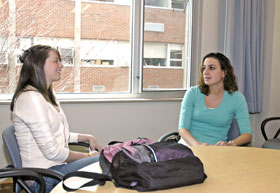Students Learn From Each Other In Peer Mentor Programs
 |
| Ashley Gaedt, left, a freshman majoring in physical therapy, talks with Andrea Goggin, a senior majoring in family studies who is a facilitator in UConn Connects, one of a growing number of peer mentoring programs on campus. Mentors help other students adjust to college life. . |
|
Photos by Dollie Harvey |
Most incoming students learn about life at UConn from student leaders during the Orientation Program. But while the “O-Leader” is often a student’s first encounter with peer education at UConn, it is unlikely to be the last.
Peer educators facilitate First Year Experience courses; they serve as career resource assistants, critiquing student resumes and conducting mock interviews; they tutor on behalf of academic departments and programs, such as the Writing Center and the Quantitative Center; they educate and raise awareness of issues of health and well-being. In fact, through 35 different programs, hundreds of peer educators have a profound impact on several thousand fellow students every single year.
Each of the 35 programs has its own training courses for mentors, model for operation, and method of assessment, but all share the same goal of creating more successful college experiences for students, says Rebecca Maclure, coordinator of peer education: “They have different content, but the same intent.”
Scholarly research – notably that of Alexander Astin at UCLA – supports the positive effects of mentoring, but UConn administrators, faculty members, and students say they don’t have to look far to see the advantages of having trained students serve as resources to other students.
The benefits for “mentees” are obvious and sometimes dramatic. Maclure cites instances of undergraduates on academic probation who, after receiving assistance from UConn Connects mentors, not only improved their academic performance significantly, but also were inspired to become mentors themselves.
The rewards for mentors include developing leadership skills and collegial relationships with faculty members. Charles Vinsonhaler, a professor of mathematics, says mentors enjoy academic benefits as well. He points out that tutors need to truly master the material before they can teach it to someone else.
“Students are getting more individual help in their coursework [than a single a professor could provide],” he says, “and tutors are getting a clearer understanding of the material.”
What exactly makes peer education effective? Steven Zinn, an associate professor of animal science, believes the key is that mentors are much closer to the experiences of the students they teach than professors, who are generally from a different generation. Mentors know, for example, how many hours of homework it takes to do well in specific courses – which they may have taken as recently as the previous semester – as well as more general knowledge about how to succeed at UConn.
Zinn says he seeks FYE course mentors who can relate to students who are struggling. He says when he picks a student to be a mentor, he usually looks for one who has been through his FYE class and done well academically but has also experienced some challenges.
Julie Friedlander, a peer educator in the Student Ambassadors for Human Rights Program under the aegis of the UNESCO Chair, agrees that mentors need to be able to identify with their peers and vice versa. “I don’t believe that a person can be successful in peer education without the capability of fulfilling both roles,” she says. “This is because everyone is always going to need help at some point, and everyone is always going to be in the position to help someone else.”
Senior Anthony DiChiara, a recipient of the University’s Peer Educator of the Year Award, says peer education has had life-changing effects for him. Having enjoyed a very positive orientation experience, he “wanted to be able to do for a group of freshmen what my O-Leader did for me.”
DiChiara subsequently served as an orientation leader, an FYE mentor, and a community assistant (as resident assistants are now known), among other efforts. He says his peer mentoring “snowballed into what has become my UConn experience, which I would not trade for almost anything in the world.” He now intends to pursue a career in higher education and student affairs administration.
David Ouimette, director of First Year Programs, says that peer education has long had a place at UConn, particularly through the long-standing resident assistant system. Other programs grew out of what was perceived to be a very successful model. In 1998, a grant from the then-Chancellor’s office offered support for a more centralized approach, creating a formal umbrella organization based in the First Year Programs Office.
“The idea was to develop an infrastructure to support the programs,” says Ouimette.
Among other activities, the Peer Education Office maintains an extensive website and helps programs network with each other and share best practices through the peer education directors meetings, the Peer Education Student Advisory Committee, and such events as last summer’s PeerFest conference.
Maclure says that both the School of Allied Health and the Neag School of Education have expressed an interest in creating formal academic mentoring programs for next year, evidence that peer education is continuing to gain momentum. For her part, she says she’d like her office to develop more formal ways to measure the efficacy of peer mentoring, which tends to happen on such an individual and personal level.
But while institutional support is an important part of the equation, Maclure says, “it’s the students who are the agents of success.”

